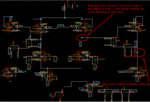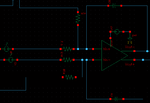mretsh91
Junior Member level 3

I am working on a 2 stage fully differential op amp, but I have a problem with the CMFB ...please I need help with the suitable CMFB ??? I believe that I need only 1 cmfb block that will adjust both stages ,,,but I don't know the suitable technique ...I want to apply it now only using ideal vcvs and sensing using resistors ...just behavioral
thanks in advance

thanks in advance







